Annual Report 2020
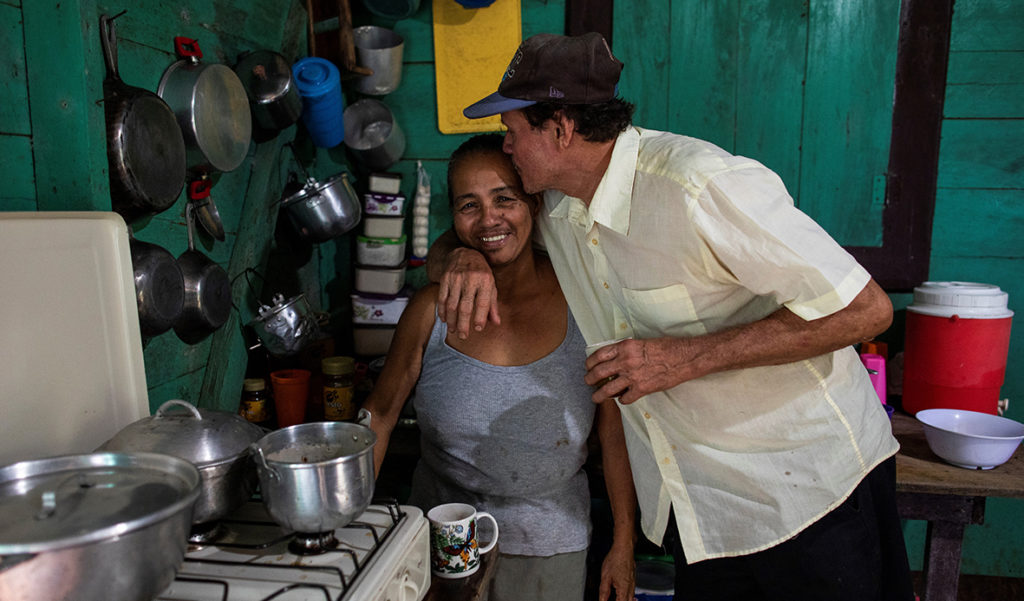
Highlights
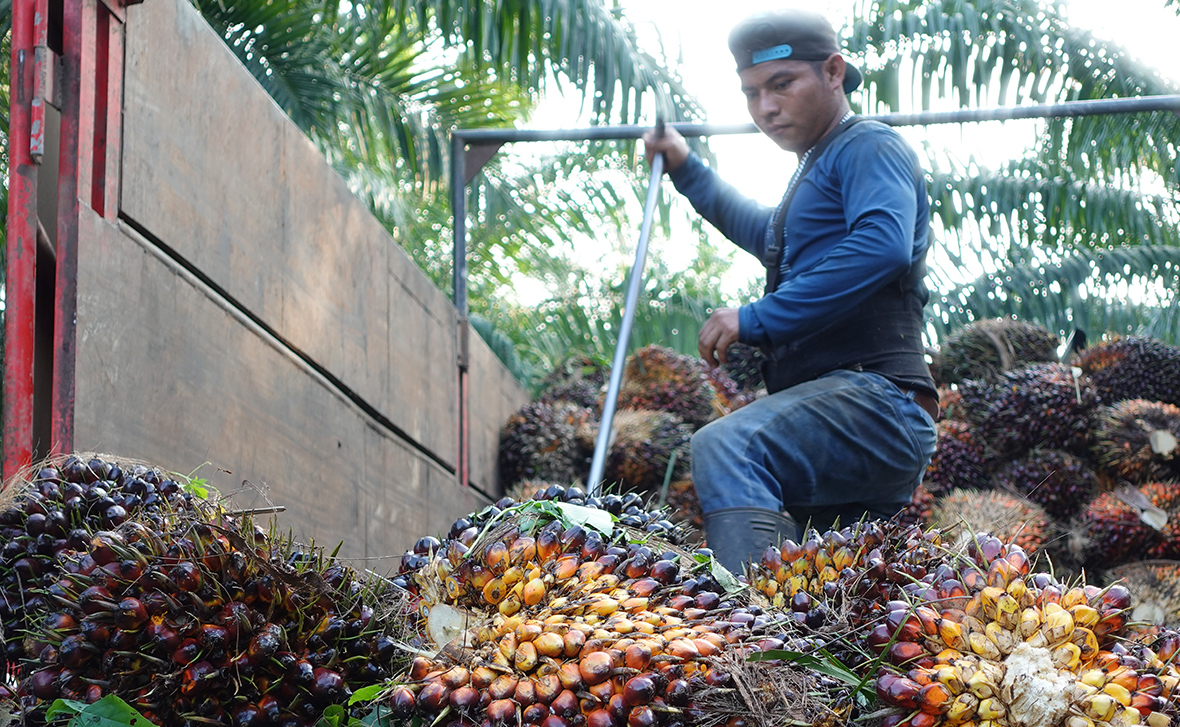
Palm Oil
We worked with 9 lead auditors and 50 public, private and civil society actors in three countries to drive the RSPO Principles & Criteria National Interpretations. Guatemalan and Honduran working groups collaborated remotely in a total of 57 webinars and led public consultations through the MAPA online platform. Nicaragua began with 15 workgroup meetings.
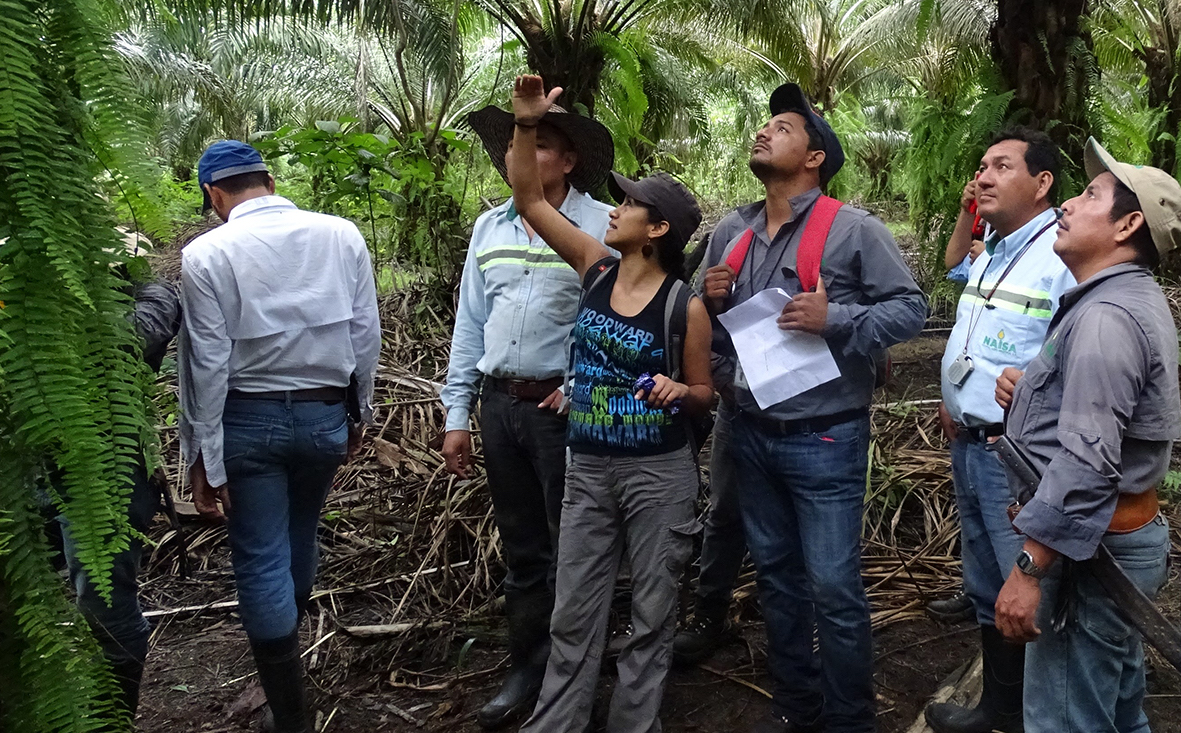
Palm Oil, continued
In Honduras, we trained 12 oil palm companies in zero-deforestation verification procedures. We provided biological monitoring and training to protect and conserve more than 15,000 hectares. In Guatemala, we continued to strengthen a remediation and compensation mechanism that protects and conserves 28,000 hectares in Laguna del Tigre National Park.
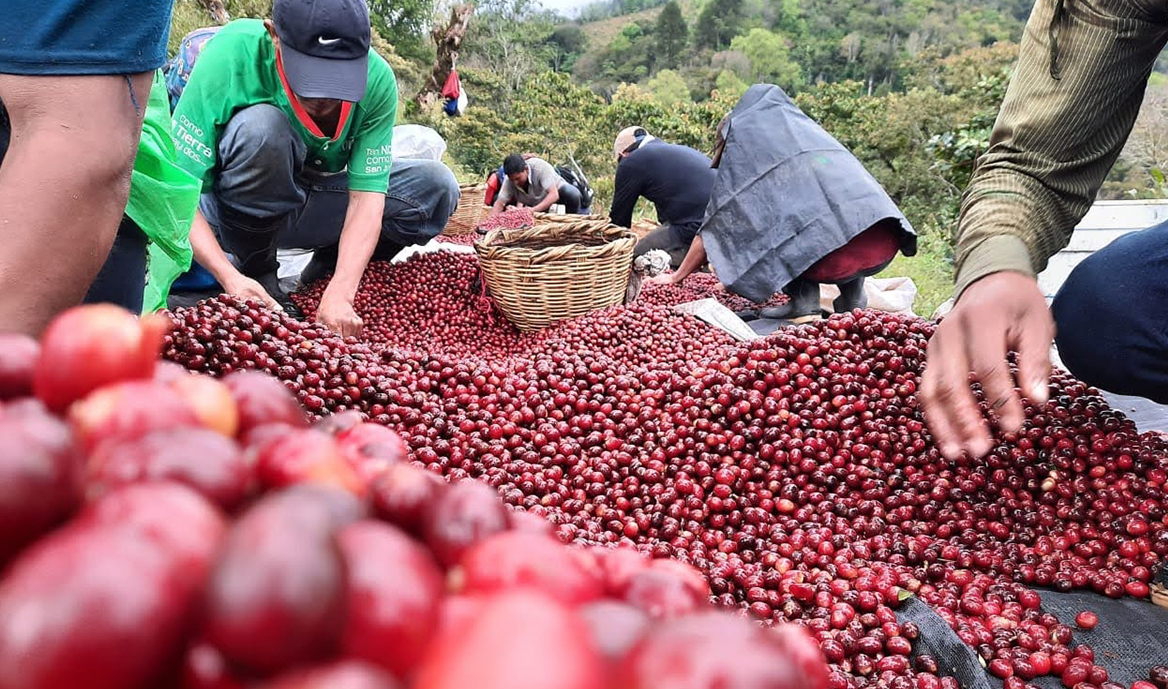
Coffee
In Mexico, Common Yaj Noptic Cooperative fully adopted the climate-smart coffee model, expanding from 10 to 456 producers/workers implementing the model, who improved average productions from 6 metric quintals per hectare to 13 qq/ha. We began replicating the model in Nicaragua, by training 35 Mercon partner technicians who will later replicate with farmers.
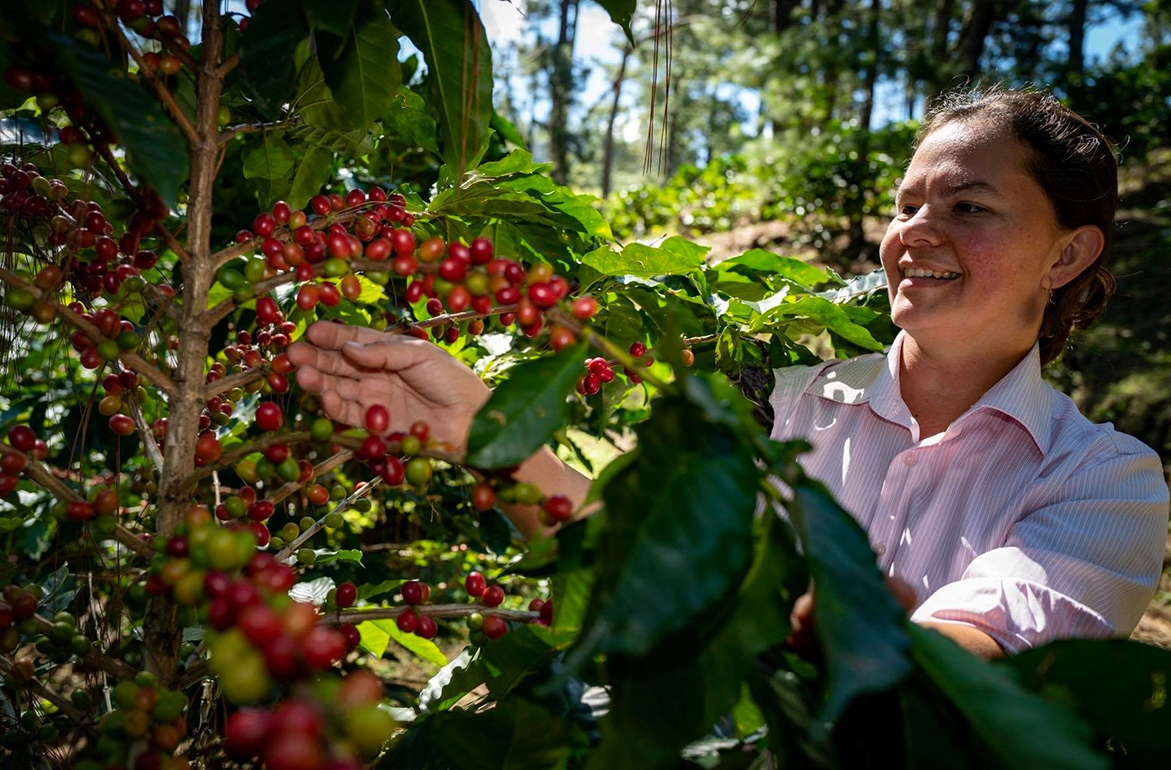
Coffee, continued
In Honduras, we led and supported the development, articulation and approval of the national gender policy within the coffee value chain by liaising with the public sector, CSOs and other actors through the national chapter of the Global Coffee Platform, Plataforma de Café Sostenible de Honduras (Sustainable Coffee Platform of Honduras).
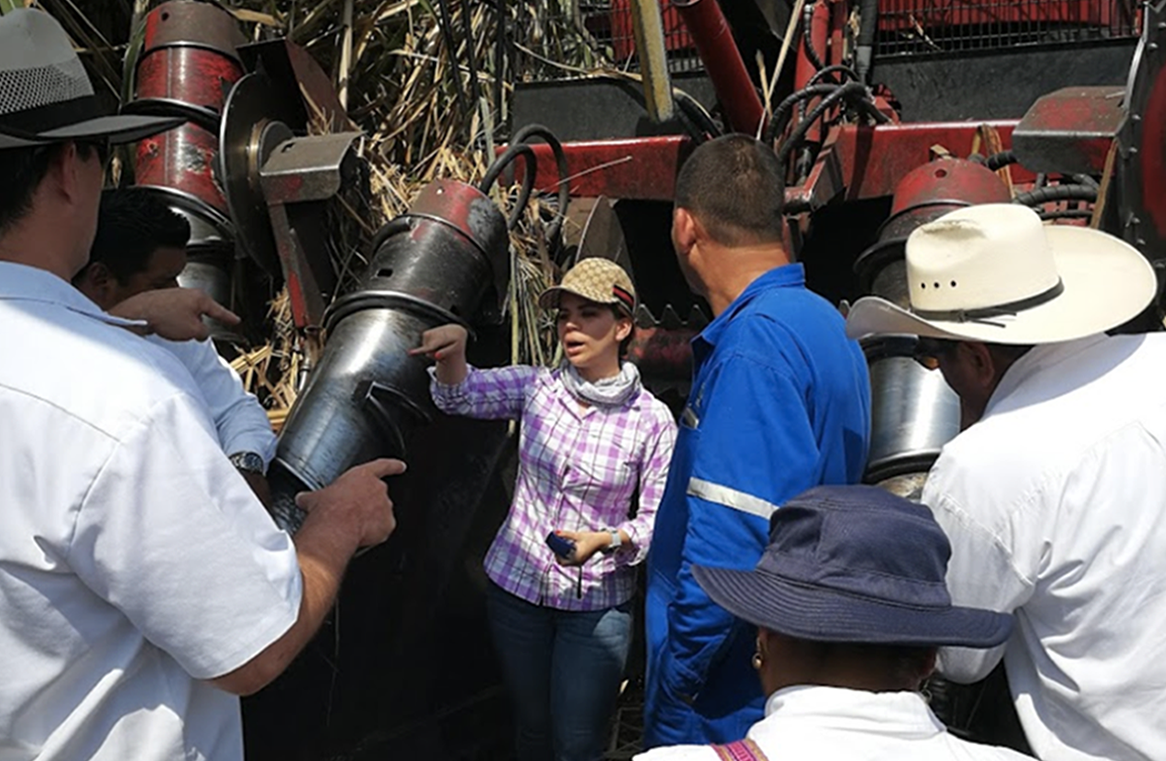
Sugar
We partnered with Coca-Cola, Barry Callebaut and CNPR, the Mexican farmers’ association, to pilot a responsible recruitment programme. PanameriCaña developed a programme guide focused on preventing forced and child labour and promoting gender inclusion, health and safety programmes, social security coverage and many other fair labour practices.
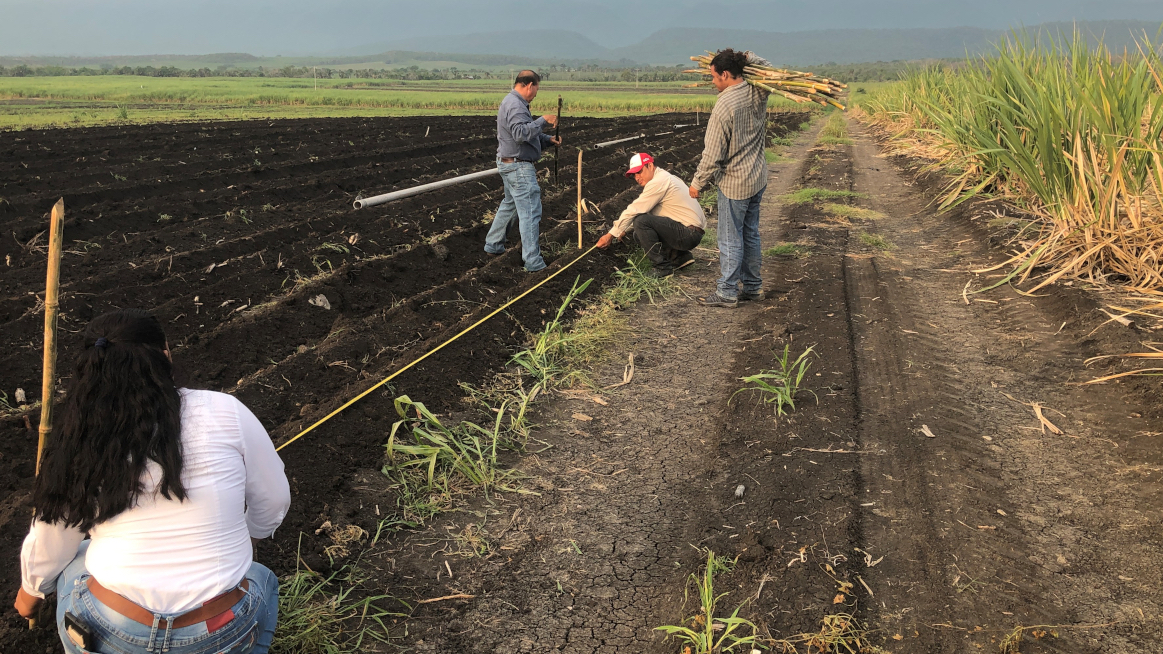
Sugar, continued
We trained 874 producers, technicians and workers from Plan de San Luis Sugar Mill (PIASA Group, Mexico) through the Bayer MAS-CAÑA project to produce sustainable sugarcane more efficiently. The project installed 49 demonstration plots that helped model best practices that ultimately resulted in producers improving productivities by 20% on 5,438 hectares.
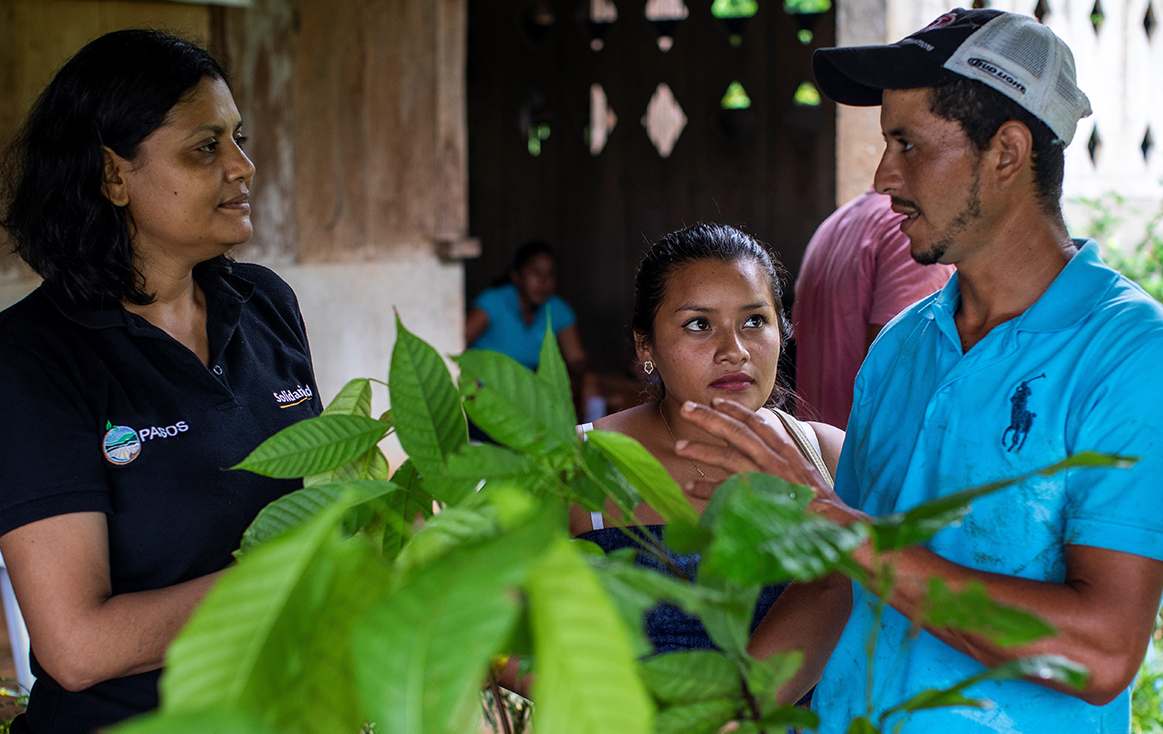
Cocoa
In Nicaragua, we modeled best practices for producers and promoters in demonstration plots and field schools. We further trained promoters to adopt technology and help farmers solve day to day production problems. Cocoa farmers leverage newly certified (Rainforest Alliance) cooperatives —where sales increased by 118% in 2020— to market their production.
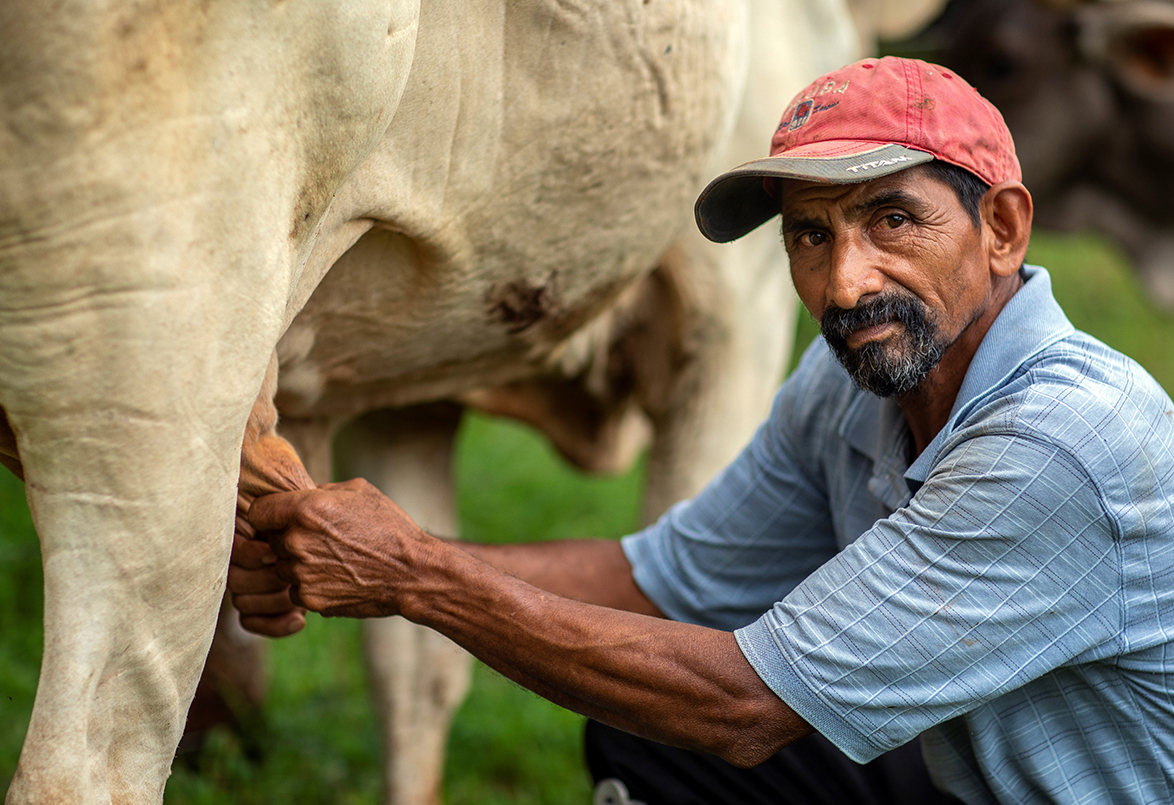
Livestock
Through a pilot programme in Nicaragua, we co-established a zero-deforestation livestock platform, alongside stakeholders from the private and public sectors, producer organizations and CSOs. We carried out a feasibility study for diversifying livestock farms with cocoa, including research and analysis of national policies pertaining to the proposed solution.
Results
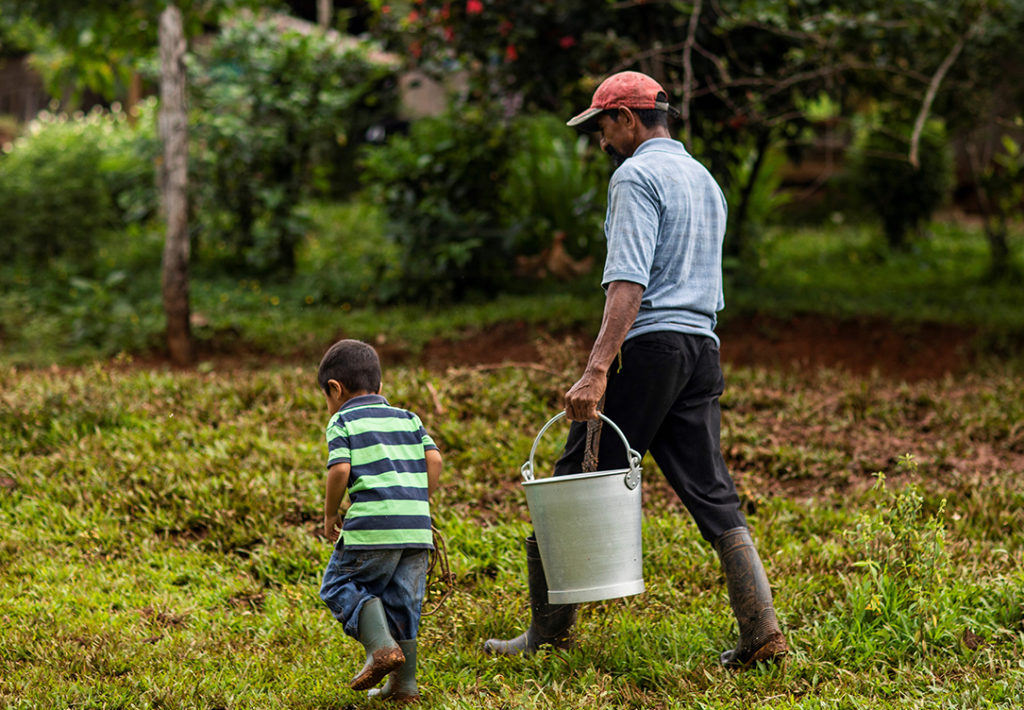
A deep dive
Bringing people together
We worked across value chains to engage actors in critical conversations about climate, livelihoods, and sustainability. With significant strides made in each area, the stage is set for transformative change in the coming years.
Farmers, workers, cooperatives, companies, and mills across the region implemented climate-change adaptation and ecosystem-services generation in 2016 through 2020, improving productivity and farmer income position.
In Guatemala, of the 636,232 tons of crude palm oil (CPO) produced by ten companies, 79 percent was RSPO certified and came from 63,000 hectares (ha) of RSPO-certified plantations. An additional 54,025 ha are also managed under good practices. Ixcán smallholders are pursuing certification on a total of 1,184 ha. In Mexico, 3,378 families benefited from a 22 percent yield improvement —from 14 to 18 metric tons of fresh fruit bunches per ha (MT FFB/ha)— and a ten percent improvement in quality of fruit and oil extraction —from 16.3 percent to 18.2 percent. In Honduras, 13 companies produced 536,000 MT of CPO —16.61 percent is RSPO certified and 27.45 percent holds the International Sustainability & Carbon Certification (ISCC). In Nicaragua, we improved productivity from 16 to 24 MT FFB/ha (2018-2020) and reduced costs originating from bud rot from 24 percent to 6 percent. Five companies adopted better social and environmental policies and regulations.
Thirty-eight sugarcane mills across the region improved social performance for 33,501 workers by adopting better social and environmental practices. A total of 1,605 producers improved their income position through improvements in their yield and productivity.
In Nicaragua, 130 livestock and 90 cocoa farmers increased their income by 6.3 percent. In Mexico, 148 coffee producers increased their production volumes by 232 percent.
Solidaridad implemented 36 strategic innovations in 2016 through 2020 to increase speed and scale of good practices across supply chains in the region. In Honduras, we developed a regionally-applicable business model for substituting fossil fertilizers with compost made from organic biomass in oil palm plantations, reducing greenhouse gas emissions. We began installing our climate-smart coffee model —developed in Chiapas, Mexico— in Nicaragua to help 300 farmers mitigate and reduce carbon emissions and strengthen their food security and adaptation to climate change by 2022.
Across the region, we increased awareness and facilitated broader social inclusion through 34 national or regional stakeholder platforms, networks and groups to improve social, environmental and labour practices in palm oil, coffee and sugarcane. For instance, PanameriCaña and MAPA are regional platforms for which we created online spaces, through which we facilitate learning and exchange. In PanameriCaña’s case, we use it to promote adoption of Bonsucro and SGAP criteria.
Solidaridad developed attractive business cases for impact investors to ensure long-term financial sustainability, such as remediation and compensation funds in Guatemala for palm oil companies.
Throughout the region we facilitated knowledge and technology transfer, introducing partners to training models, tools and mobile information and communication technology (ICT). In Nicaragua, we trained a network of community promoters on climate-smart cocoa and livestock practices who then transfer the knowledge to producers. Promoters use ICT tools, like Harvest Estimation, that —along with climate bulletins they receive on a weekly basis, from meteorological stations we installed— help farmers make timely decisions.
In 2016-2020, we facilitated multi-stakeholder advocacy for the development of 11 public and private, local and national policy recommendations for sustainability and supported 83 brands and companies to implement national regulations or commodity voluntary standards.
In 2020, Solidaridad led RSPO National Interpretation processes in Guatemala, Honduras and Nicaragua through technical committees that organized using the MAPA online platform. We also promoted the adoption of Bonsucro standards across the region in sugarcane mills.
In Mexico, Solidaridad recommended a national training plan policy through the National Sugarcane Union (UNC-CNPR) and supported the development of CNPR’s national sustainability strategy. We also piloted responsible recruitment in a Grupo PIASA sugar mill and supported the implementation of water, rest and shade protocols across sugar mills.
In Honduras, we supported and led the development, articulation and approval of the national gender policy within the coffee value chain in Honduras by liaising with the public sector, CSOs and other actors through the sustainable coffee platform. In palm, we engaged with stakeholders through the technical commission that follows up on matters pertaining to the zero deforestation agreement signed in 2019 and engaged with the National Agricultural Institute to implement the land titling protocol for smallholders. Through PaSos, we convened dialogue groups in eco-agritourism, cocoa and palm oil biodiversity.
In Nicaragua, livestock smallholders leveraged the PaSos multi-stakeholder platform to promote zero deforestation and other landscape initiatives. Solidaridad also supports the national sustainable coffee platform in Nicaragua, which developed a national strategy to promote sustainable growth of the value chain.
In 2020, we continued to test our integrated landscape management (ILM) solutions.
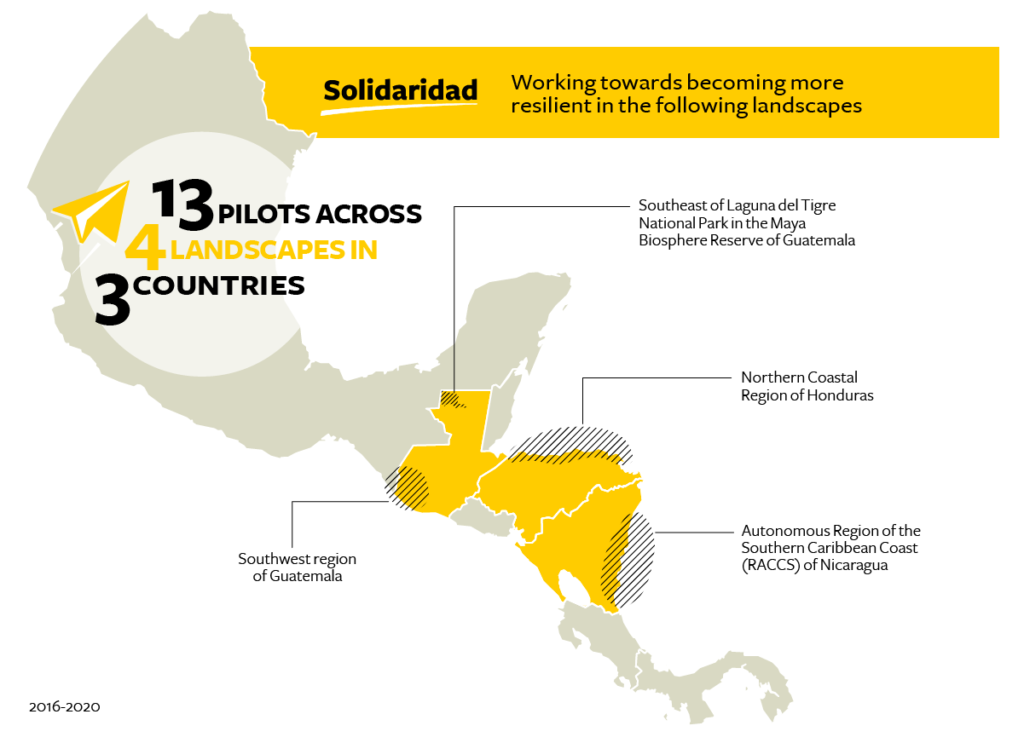
In Guatemala, we collaborated with Rainforest Alliance to test LandScale, a landscape-level sustainability assessment tool. Solidaridad supported the tool’s development to facilitate access to insights that guide and incentivize sustainability improvements at scale. We continue steering the 25-year Remediation and Compensation RSPO-compliance mechanism, which Solidiaridad first negotiated and co-designed to protect and conserve 28,000 ha in Laguna del Tigre.
In Honduras, we facilitated a private-public collaboration to accelerate land titling for 570 oil palm smallholders, opening their access to credit and incentives to invest. We provided biodiversity monitoring and conservation training to 200+ staff from two companies to verify whether species of relevant fauna use plantations as connectors to adjacent protected areas. Through a women-led cocoa pilot where 3,492 ha are managed under climate-smart practices, we focus on demonstrating agroforestry systems’ high ILM value.
In Nicaragua, we conducted high conservation value assessments with five palm oil companies to facilitate subsequent conservation-restoration interventions. We built capacity for 49 public, private and CSO stakeholders that are now capable of developing and implementing landscape solutions. To prevent aggressive plantation expansion, one palm oil company funded a small-scale pilot (10 smallholders, 200 ha) to validate an inclusive business model that incorporated livestock and cocoa in agroforestry. Sustainable livestock pilots linked 17 livestock associations that established an agreement to create the national sustainable livestock platform. The private sector agreed to back the indigenous-led zero-deforestation livestock from the “Indio Maíz” reserve.
Innovation Areas
Results
Challenging the status quo
Although Covid-19 created challenges in carrying out our planned activities, we were able to adapt and leverage both our on the ground presence and digital tools to continue meaningful engagement with smallholders.
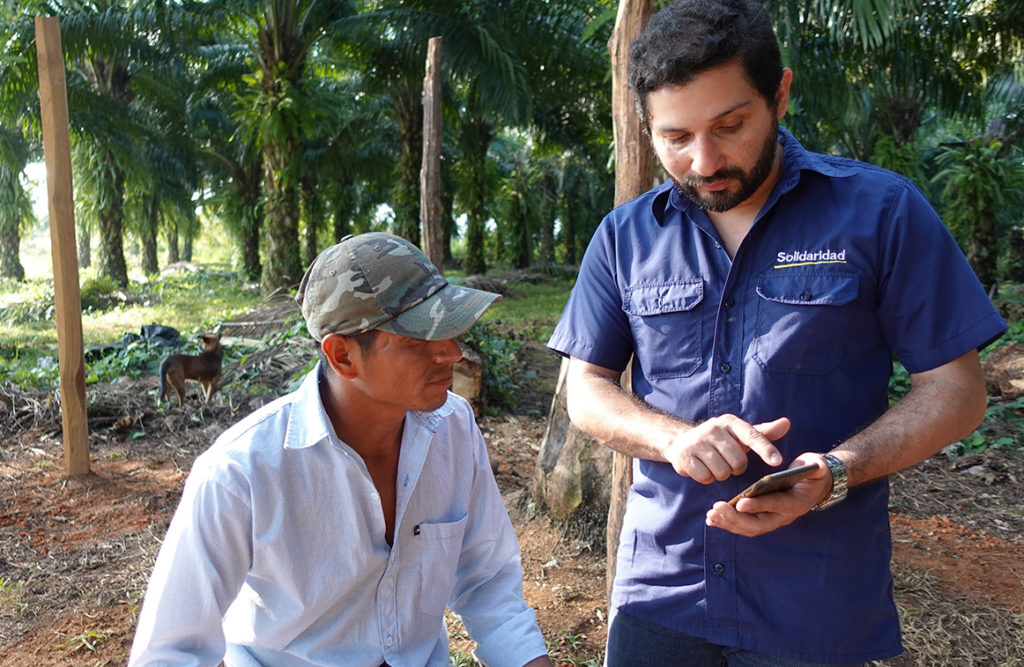
Solidaridad weaves gender inclusion into interventions by raising awareness and building sensitivity through workshops, experience exchanges, storytelling and other tools. In 2020, along with providing gender workshops to Solidaridad regional staff, we:
- contributed to improving RSPO guidelines, which include gender inclusion, labour rights, and other similar issues, through staff participation in the Human Rights Working Group.
- strengthened capacities, such as good agricultural practices, good manufacturing practices and/or decision-making power, for more than 200 women in the cocoa and livestock sectors in Nicaragua.
- established partnerships and served as liaison between the Cocoa and Chocolate Women Network of Honduras (REDMUCH) and two other partners, facilitating the design of an online sales platform.
- supported a Honduran palm oil group in updating corporate gender protocols and linking with a public sector partner to provide a healthcare brigade to workers with a special focus on raising breast cancer awareness and ensuring reproductive health.
- partnered with Rikolto and the National Coffee Board to develop and drive approval of a national gender policy within the coffee value chain in Honduras.
- provided gender training to more than 2,000 people across the palm oil and coffee sectors, including mill workers, farmers and their families, in the region.
Following Solidaridad’s gender training in Mexico, two oil palm companies included women on their board of directors.
In 2020 Q1, Solidaridad developed and pitched two new investment proposals for the region: the Across Forest land restoration project with Mirova/Althelia and the San José smallholder RSPO palm project with FMO. While the former did not result in an agreement with the investor, the latter is under negotiation, with delays caused by Covid-19.
Following the Covid-19 outbreak, Solidaridad focused efforts on new business development, to bring in funding for ambitious climate-smart commodities and landscapes projects. These proposals were designed around blended finance models, combining grants, technical assistance, climate finance and impact investment. In particular, the palm NAMA project in Honduras seeks to facilitate 50m USD (~42m euros) to transform the sector into a low-emissions industry and strengthen it’s circular economy, based on significant public and private investment with early commitments from the Central American Development Bank, BCIE. Discussions are also ongoing with other investors and national banks to scale up finance upon project approval (pending, 2021). We secured funding through the Dutch Ministry’s Power of Voices to invest additional resources in access to finance for the Honduran coffee sector in 2021-25.
Solidaridad also began to develop the PlusPlus pipeline in 2020. We identified an initial 10 SMEs in Nicaragua, Honduras and Costa Rica, assessed five of these in depth and submitted investment projects to PlusPlus for two of them, both of which are in final approval stages.
Solidaridad emphasizes programmatic strategies using MESA, an integrated landscape approach with the goal of linking multiple stakeholders to work together for policy change and sustainable financing to ensure sustainable solutions. Climatic events that devastated the region in late 2020 continue to highlight its vulnerability and the need for large-scale, immediate and innovative solutions to improve climate-adaptability of producers across value chains and contribute to national mitigation goals. Solidaridad focused significant efforts and resources in 2020 to develop climate-smart programmes and proposals that respond to critical needs and opportunities across the region. In Nicaragua, we collected field data from palm oil and cocoa farmers (approximately 120 for each commodity) to test the Climate Smart Index. The final report will be available in 2021. In Honduras, we solidified strategic relations with ministerial partners who now rely on Solidaridad as a go-to advisor and implementer of climate-smart programming that ensures multiple benefits to multiple stakeholders.
The table in the finance and fundraising section highlights key proposals submitted during 2020 to pursue adequate funding and construct a short- to mid-term landscape and climate change programme in the region.
Due to Covid-19, many field activities, such as training, data collection and technical assistance, were replaced by the use of information and communication technology (ICT). For this reason, the regional strategy in 2020 was to increase field officers’ and lead farmers’ access to mobile applications. Additionally, we included a higher number of ICT development and adoption commitments in projects. Among the most relevant ICT results in 2020 are:
- 100% of Planning, Monitoring, Evaluation, Learning (PMEL) staff trained in Salesforce report generation.
- 100% of technical assistance formats digitized for cocoa, livestock and oil palm commodities.
- RSPO compliance checklist app ready for pilot.
- minimum viable product for Farm Diary app validated through pilots in 3 countries, paving the way for a version 1.0 of the app, which will allow a larger scale and go-to market planning.
Without yet being officially on the market, Farm Diary’s return on investment has already reached 30%. The app garnered interest across Solidaridad’s network and from companies in Nicaragua and Honduras, with commitments and proposals in place for development in 2021. We will also explore combining satellite images with Farm Diary data to implement a zero deforestation and traceability strategy and improve farmer prices.
In Q3, the regional ICT unit began developing the PMEL arena in PLAZA, the global project management platform. Additionally, we continued to improve the regional internal information management system (JUNGLA) to match the global system, including increasing automations for KPI calculation and reporting.
Most significant changes
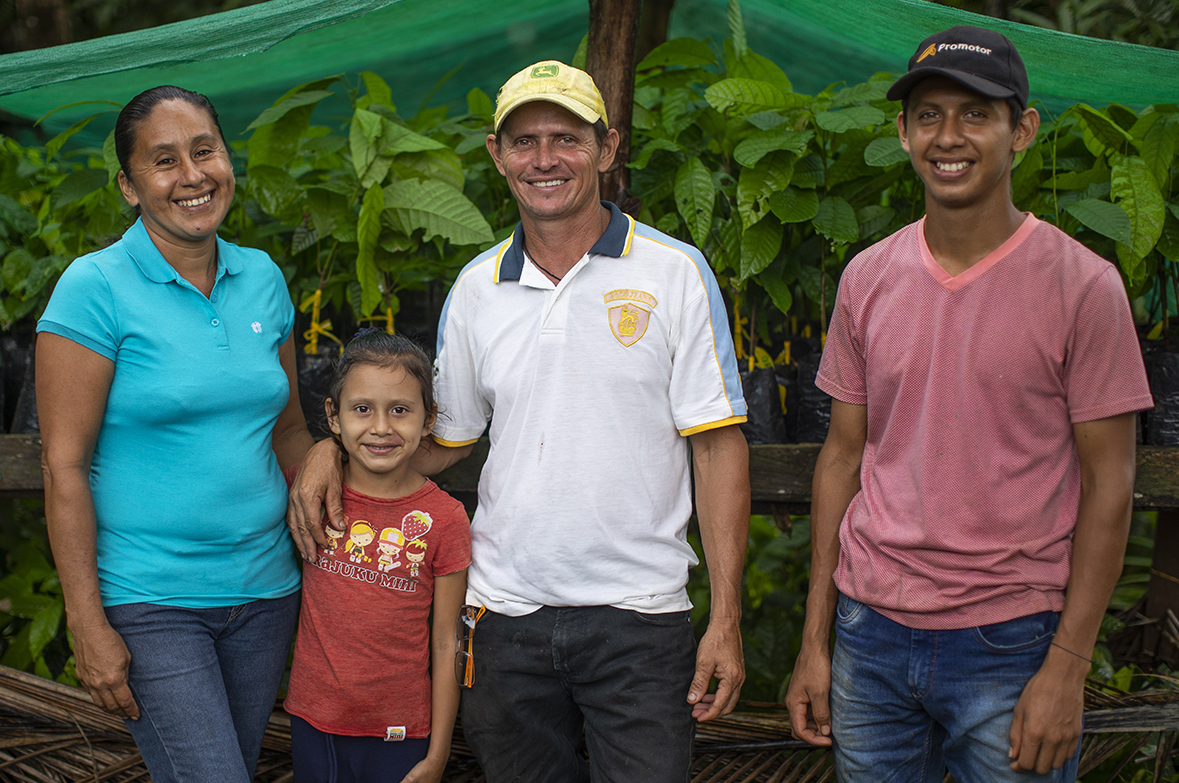
Building cocoa smallholder capacities strengthens family income
Solidaridad builds smallholder cocoa farmers’ capacities, so they can take full advantage of landscapes and increase their incomes.
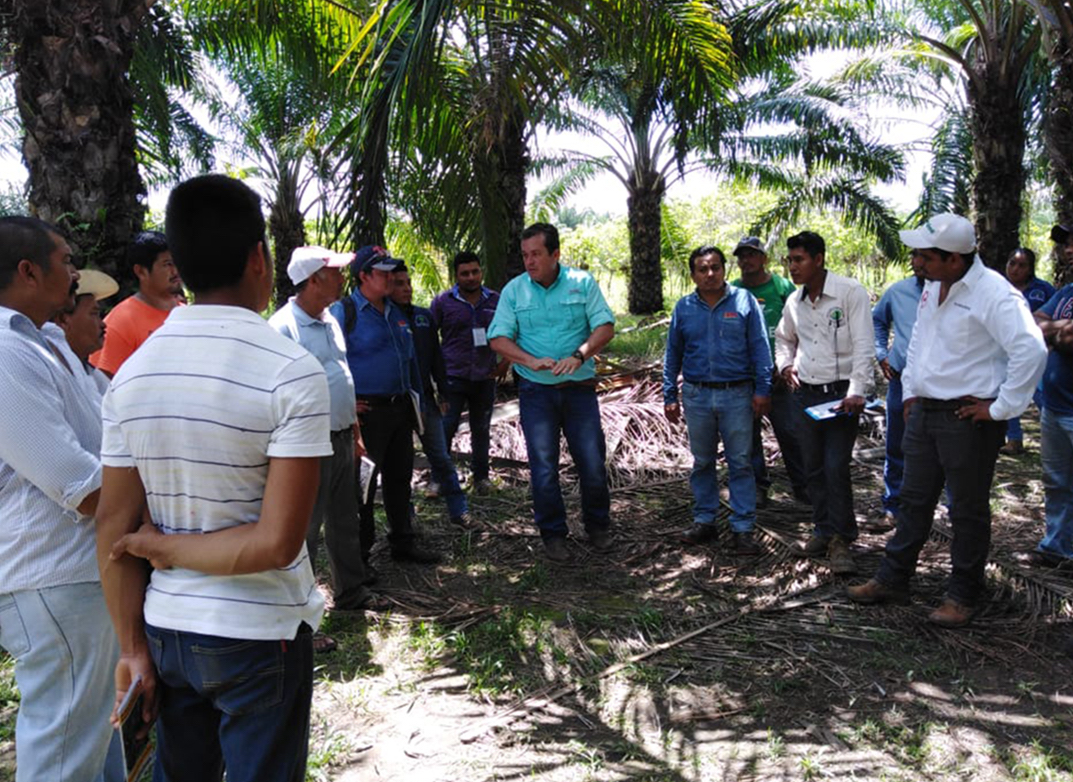
Working directly with stakeholders drives sector transformation in palm oil
Through the Mesoamerican Palm Oil Alliance, MAPA, Solidaridad gathers more than 55,000 stakeholders along the entire palm oil supply chain in the region—from small- and large-scale producers and extraction plants to buyers and civil society.
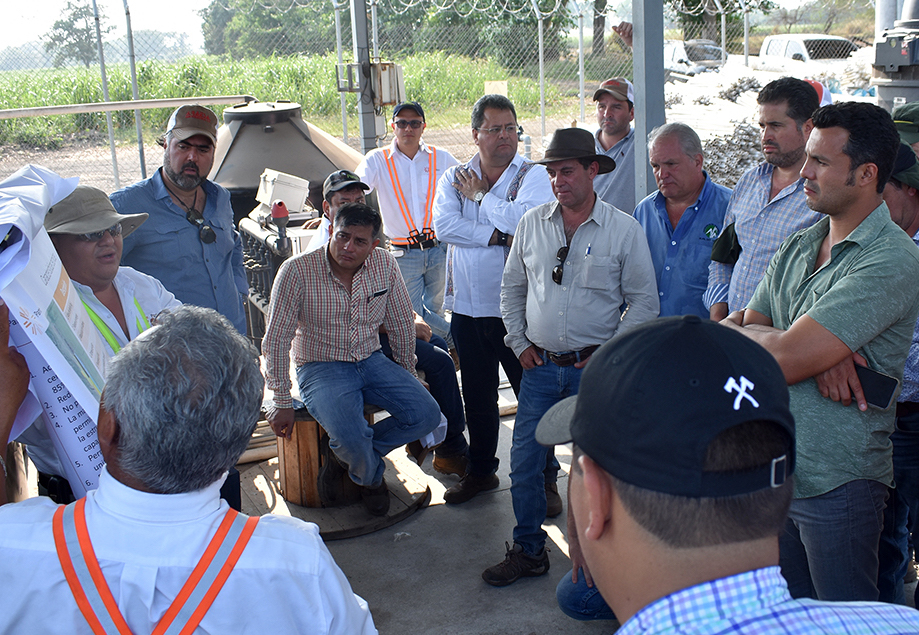
Leveraging tech to drive transformation in the sugarcane supply chain
Through the PanameriCaña multi-stakeholder platform, Solidaridad uses experience exchanges, international conferences and other methods to engage key leaders, sugar mill technicians and sugarcane farmers and workers in meaningful conversations about sustainable production, the reduction of environmental impacts, and social and labour issues. Empowered with networking opportunities, built capacities and new knowledge, stakeholders can therefore take action to transform their sector into a more sustainable one.
Organization & governance
Developments
Raising the bar
In 2020, we contributed to the policies around gender equity and inclusivity, which spanned the whole organization from staff to programmes and partners. We built new partnerships and strengthened existing ones, allowing us to amplify impact through collaboration.
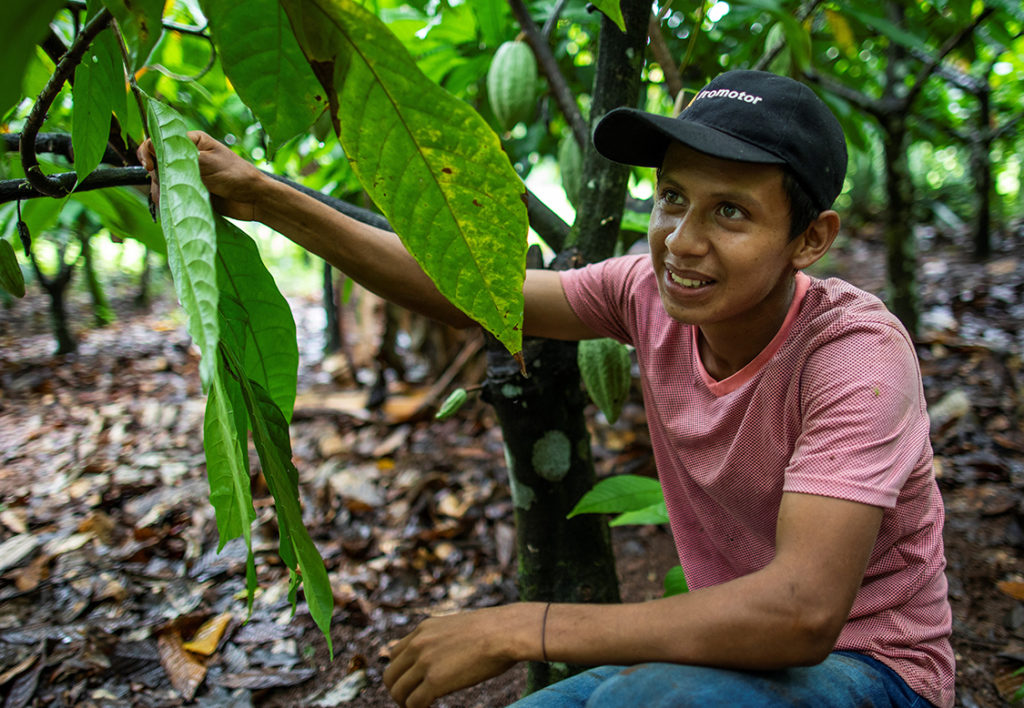
In 2020, we fully revised our regional HR manual, which includes policies related to equality and diversity, sexual harassment and bullying, and network-wide code of conduct and whistleblower procedures. The manual is published on the Solidaridad intranet. The communications team launched an internal campaign to highlight our integrity program, and developed plans for an internal values campaign in 2021. Internal and external Integrity Advisors have been appointed, and Persons of Trust will be appointed in early 2021. Solidaridad supports network-wide human resources requirements and working groups. In 2021, a regional salary bench-marking exercise will take place, and will produce and internally publish a transparent salary scale. A 0.5 FTE human resources manager has been appointed, to begin in Q1 2021. A significant achievement was the external operational audit conducted by the United Nations Development Programme, a requirement for the Global Environment Facility execution role. Solidaridad continues to build HR functionality in Salesforce, to streamline and optimize internal processes.
Solidaridad leveraged enduring partnerships with private sector palm oil companies to develop several ambitious climate finance proposals for the Global Environment Facility (GEF) and Nationally Appropriate Mitigation Actions (NAMA) Facility. Please refer to the fundraising section for further details. Mexican sugar mills have displayed growing interest in targeted engagement on a number of key sustainability challenges. Our partnership with Bayer to improve smallholder sugarcane producer productivity in Mexico continues to thrive. With Barry Callebaut and Coca Cola, Solidaridad implemented a Responsible Recruitment pilot in the Mexican sugar sector, with goals to elevate it to national-level policy with the national farmer association, UNC-CNPR. In coffee, a new partnership with Mercon enabled the transfer of our Climate Smart Coffee Lab developed in Chiapas, Mexico to Nicaragua, and Solidaridad led the facilitation of the National Gender Policy in Honduras with a multi-stakeholder partnership. Also in Nicaragua, a new partnership with Rittersport formed to test the applicability and impact of digital solutions with smallholder cocoa producers. Solidaridad formed multiple strong partnerships with government actors in Honduras, signing agreements with the ministries of environment, agriculture and energy, as well as the Presidential Office for a Green Economy (OPEV) and the Presidential Office for Climate Change (Clima+). We also formed a partnership with the Inter-American Institute for Cooperation on Agriculture (IICA). There is growing interest from regional and global partners to adopt Solidaridad digital tools, especially Farm Diary.
The regional PMEL team strengthened capacities for the entire project management cycle and contributed significant knowledge to the development of a Salesforce-based internal data management system that will deliver timely insight for our PMEL, development, communications and financial management teams. In 2020, we:
- carried out four programme design workshops, which were the basis for proposals development (NAMA Facility, Julius Bear, RS coffee and Palma).
- received training from the ICT team to improve data management and use through the construction of Salesforce reports and dashboards.
- contributed to developing the network monitoring protocol (Multiannual Strategic Plan III indicators) and the data model for data collection.
- implemented an information management system to improve data management and collection, including project planning and tracking through a digital tool linked to Google Drive.
- registered 694 implemented activities and developed five dashboards to follow project implementation at the project and country levels.
High-level efforts were made to widely disseminate knowledge and bio-security protocols in response to the COVID-19 pandemic, which hit many industry partners hard. The pivot to virtual events and technical assistance elevated the role and contribution of the communications team to events where top-quality presentations and a seamless execution were vital to our success. Our regional outreach through virtual events extended well beyond the intended audience, with participation across the Mesoamerican and Caribbean region, as well as South America.
In 2020, Solidaridad participated in or facilitated 140 public speaking events, to increase market awareness on sustainability issues in supply chains. We engaged with 7,919 men and women who learned about or shared their experiences in topics such as gender inclusion, biodiversity, carbon credits and clean energy, climate change, certification, sustainable landscapes, among others. We also made breakthrough publications on our websites and LinkedIn, training and involving the entire regional team to stimulate thought leadership in public forums. The communications team actively supported Solidaridad’s new website and brand development.
Solidaridad implemented integrity policies in the region to assess a few challenges, both internally and externally with partners, in 2020. The issues were resolved following the procedures laid out in Solidaridad’s integrity framework. There were no whistleblower issues in 2020. Annually, the regional team receives training on the integrity policies and protocols.
Finance
Solidaridad maintained a similar budget level to prior years in the region but greatly increased fundraising efforts independent from our European and North American offices. To respond to increased demand from the Mexican private sector, a for-profit entity was established that will facilitate invoicing and service-delivery. The regional finance team was strengthened through ongoing participation in the global finance team and grew with the addition of a regional financial controller based in Mexico. Private sector co-financing remains an important contribution to our project implementation. The regional team contributes to and has advanced on the implementation of network-wide financial control systems, including Financial Force and Plaza.
We invested heavily in big-bet opportunities in 2020, with an increased focus on climate finance. A regional team developed a proposal for the NAMA Facility to catalyze transformation in the Honduran palm oil sector toward low-emissions technology and renewable energy generation. The team garnered the support of multiple ministry partners, the palm sector and key financing partners in Honduras, and the proposal was shortlisted for an in-depth assessment. In the coming years, we will prioritize similar big-bet “disruptive” opportunities that combine integrated and multidisciplinary approaches to improving production, with policy support and financing for impact, such as climate mitigation and adaptation.
In addition to the NAMA Facility, we pursued opportunities with new donors such as the Julius Baer Foundation, and contributed to winning proposals with the Dutch Ministry of Foreign Affairs and the Global Environment Facility. The table below summarizes the proposals submitted during 2020 to pursue adequate funding and construct a short- to mid-term landscape and climate change programme in the region.
We intend to build out our successful payment-for-service model in Mexico with the sugar cane sector and adapt it to other regional commodities as a funding diversification effort.
The team is pleased to continue collaborating with public and private-sector partners who have provided invaluable support over the past several years, including Coca Cola, Cargill, AAK, RSPO, Henkel, Bayer, Barry Callebaut, among others.
